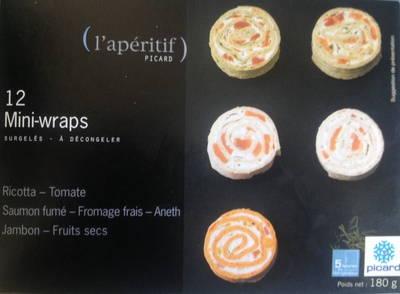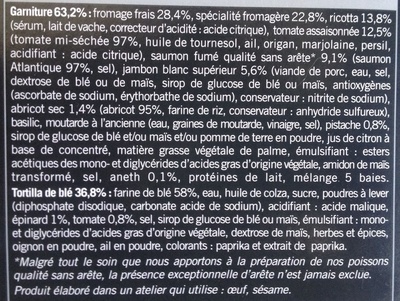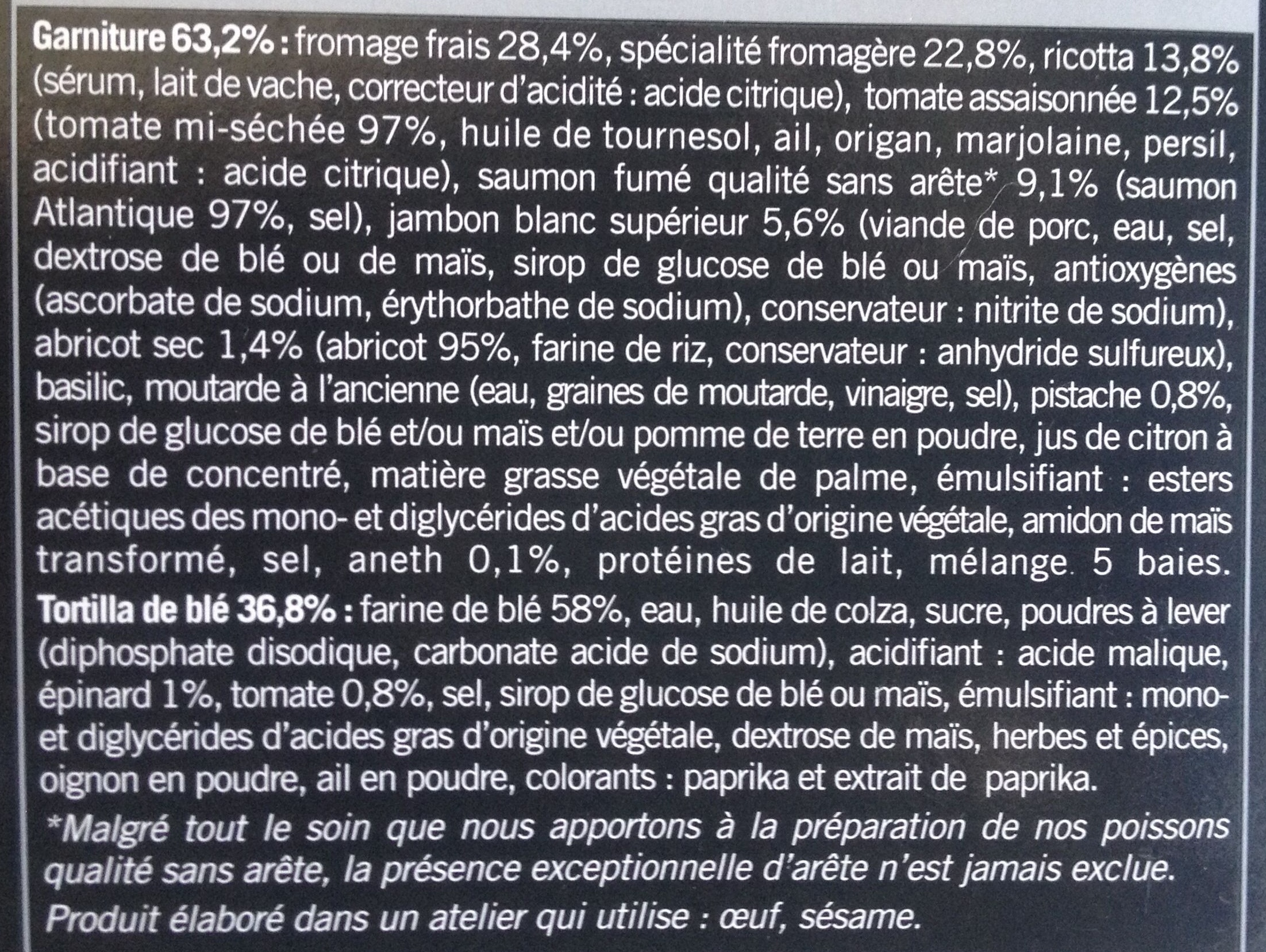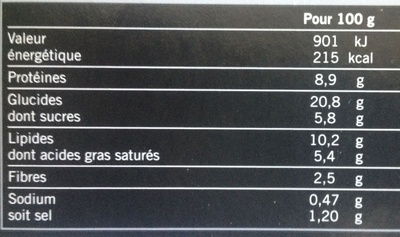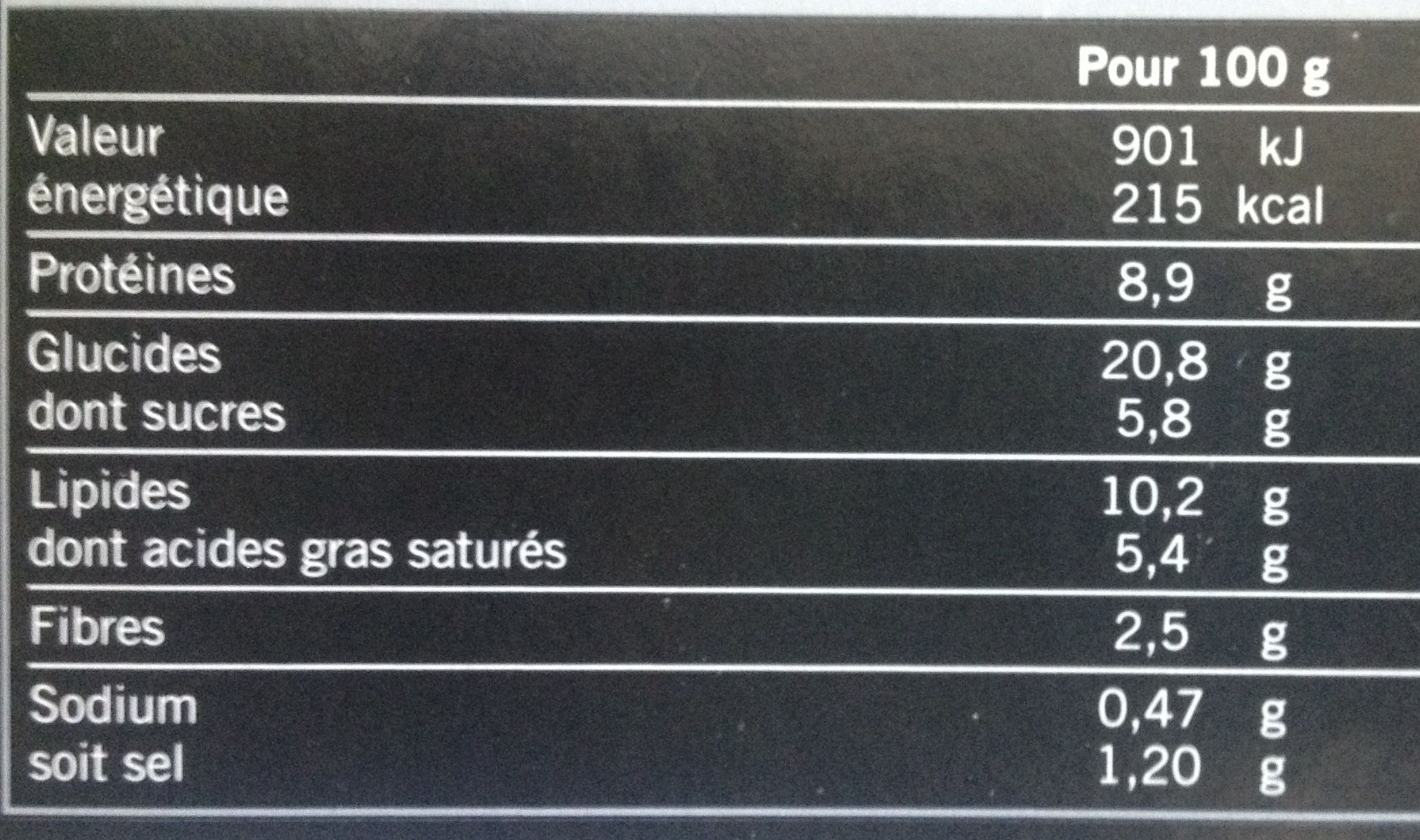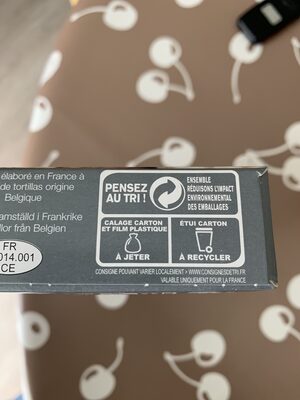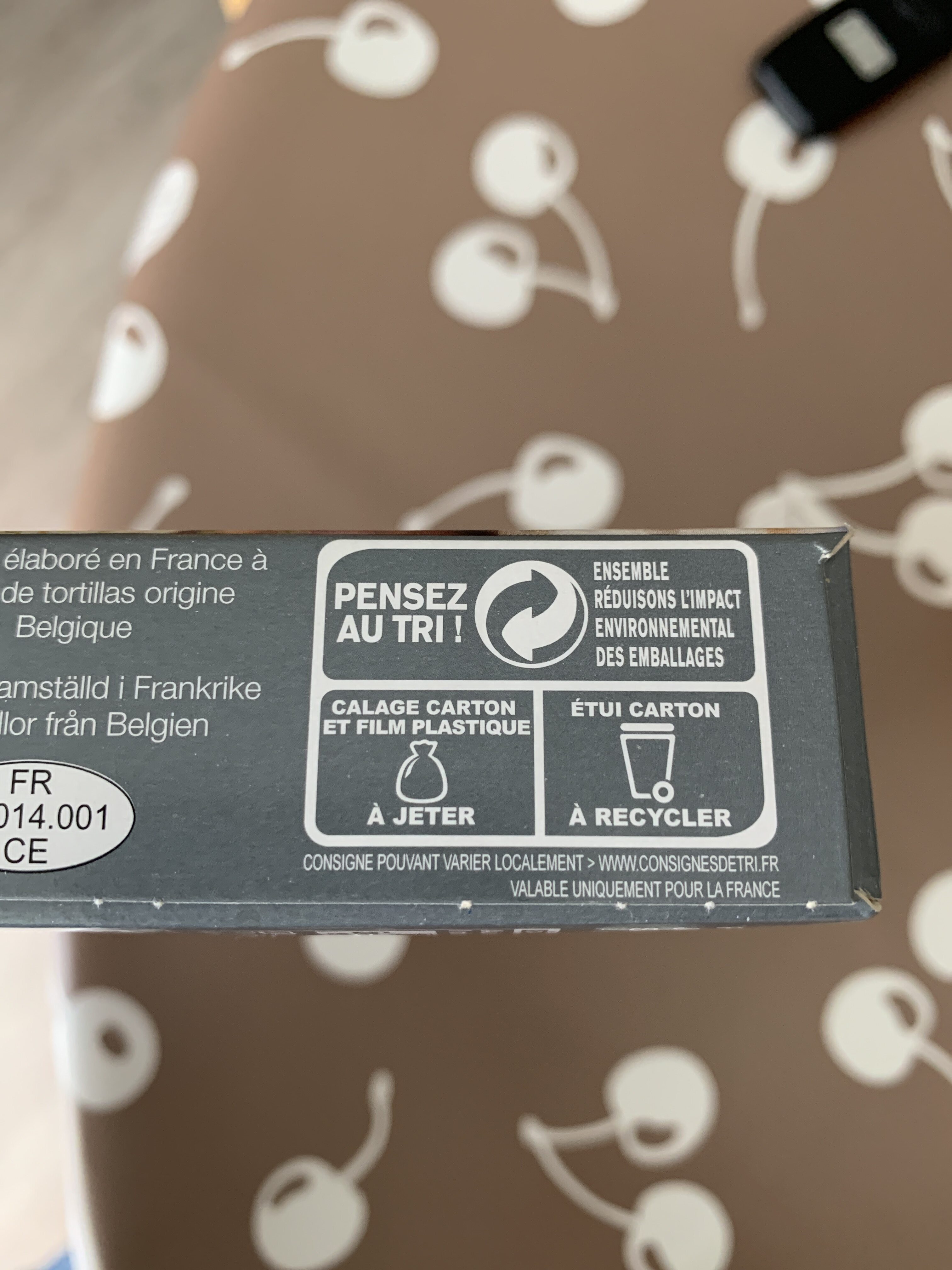Help us make food transparency the norm!
As a non-profit organization, we depend on your donations to continue informing consumers around the world about what they eat.
The food revolution starts with you!
12 mini-wraps - Picard - 180 g
12 mini-wraps - Picard - 180 g
This product page is not complete. You can help to complete it by editing it and adding more data from the photos we have, or by taking more photos using the app for Android or iPhone/iPad. Thank you!
×
Barcode: 3270160718238 (EAN / EAN-13)
Common name: Wraps
Quantity: 180 g
Packaging: Cardboard, fr:Etui en carton, fr:Film en plastique
Brands: Picard
Categories: Snacks, Salty snacks, Appetizers
Manufacturing or processing places: France
Traceability code: FR 62.014.001 CE - Aire-sur-la-Lys (Pas-de-Calais, France)
Stores: Picard
Countries where sold: France
Matching with your preferences
Health
Ingredients
-
77 ingredients
: Garniture 63,2% : fromage frais 28,4%, spécialité fromagère 22,8%, ricotta 13,8% (sérum, lait de vache, correcteur d’acidité : acide citrique), tomate assaisonnée 12,5% (tomate mi-séchée 97%, huile de tournesol, ail, origan, marjolaine, persil, acidifiant : acide citrique), saumon fumé qualité sans arête 9,1% (saumon Atlantique 97%, sel), jambon blanc supérieur 5,6% (viande de porc, eau, sel, dextrose de blé ou de maïs, sirop de glucose de blé ou maïs, antioxygènes (ascorbate de sodium, érythorbate de sodium), conservateur : nitrite de sodium), abricot sec 1,4% (abricot 95%, farine de riz, conservateur : anhydride sulfureux), basilic, moutarde à l’ancienne (eau, graines de moutarde, vinaigre, sel), pistache 0,8%, sirop de glucose de blé et/ou maïs et/ou pomme de terre en poudre, jus de citron à base de concentré, matière grasse végétale de palme, émulsifiant : esters acétiques des mono - et diglycérides d’acides gras d’origine végétale, amidon de maïs transformé, sel, aneth 0,1%, protéines de lait, mélange. 5 baies. Tortilla de blé 36,8% : farine de blé 58%, eau, huile de colza, sucre, poudres à lever (diphosphate disodique, carbonate acide de sodium), acidifiant : acide malique, épinard 1%, tomate 0,8%, sel, sirop de glucose de blé ou maïs, émulsifiant : mono - et diglycérides d’acides gras d’origine végétale, dextrose de maïs, herbes et épices, oignon en poudre, ail en poudre, colorants : paprika et extrait de paprika.Allergens: Milk, Mustard, Nuts, Sulphur dioxide and sulphitesTraces: Eggs, Sesame seeds
Food processing
-
Ultra processed foods
Elements that indicate the product is in the 4 - Ultra processed food and drink products group:
- Additive: E450 - Diphosphates
- Additive: E471 - Mono- and diglycerides of fatty acids
- Additive: E472a - Acetic acid esters of mono- and diglycerides of fatty acids
- Ingredient: Colour
- Ingredient: Dextrose
- Ingredient: Emulsifier
- Ingredient: Glucose
- Ingredient: Glucose syrup
- Ingredient: Milk proteins
Food products are classified into 4 groups according to their degree of processing:
- Unprocessed or minimally processed foods
- Processed culinary ingredients
- Processed foods
- Ultra processed foods
The determination of the group is based on the category of the product and on the ingredients it contains.
Additives
-
E220 - Sulphur dioxide
Sulfur dioxide: Sulfur dioxide -also sulphur dioxide in British English- is the chemical compound with the formula SO2. It is a toxic gas with a burnt match smell. It is released naturally by volcanic activity and is produced as a by-product of the burning of fossil fuels contaminated with sulfur compounds.Source: Wikipedia
-
E250 - Sodium nitrite
Sodium nitrite: Sodium nitrite is the inorganic compound with the chemical formula NaNO2. It is a white to slightly yellowish crystalline powder that is very soluble in water and is hygroscopic. It is a useful precursor to a variety of organic compounds, such as pharmaceuticals, dyes, and pesticides, but it is probably best known as a food additive to prevent botulism. It is on the World Health Organization's List of Essential Medicines, the most important medications needed in a basic health system.Nitrate or nitrite -ingested- under conditions that result in endogenous nitrosation has been classified as "probably carcinogenic to humans" by International Agency for Research on Cancer -IARC-.Source: Wikipedia
-
E296 - Malic acid
Malic acid: Malic acid is an organic compound with the molecular formula C4H6O5. It is a dicarboxylic acid that is made by all living organisms, contributes to the pleasantly sour taste of fruits, and is used as a food additive. Malic acid has two stereoisomeric forms -L- and D-enantiomers-, though only the L-isomer exists naturally. The salts and esters of malic acid are known as malates. The malate anion is an intermediate in the citric acid cycle.Source: Wikipedia
-
E301 - Sodium ascorbate
Sodium ascorbate: Sodium ascorbate is one of a number of mineral salts of ascorbic acid -vitamin C-. The molecular formula of this chemical compound is C6H7NaO6. As the sodium salt of ascorbic acid, it is known as a mineral ascorbate. It has not been demonstrated to be more bioavailable than any other form of vitamin C supplement.Sodium ascorbate normally provides 131 mg of sodium per 1‚000 mg of ascorbic acid -1‚000 mg of sodium ascorbate contains 889 mg of ascorbic acid and 111 mg of sodium-. As a food additive, it has the E number E301 and is used as an antioxidant and an acidity regulator. It is approved for use as a food additive in the EU, USA, and Australia and New Zealand.In in vitro studies, sodium ascorbate has been found to produce cytotoxic effects in various malignant cell lines, which include melanoma cells that are particularly susceptible.Source: Wikipedia
-
E316 - Sodium erythorbate
Sodium erythorbate: Sodium erythorbate -C6H7NaO6- is a food additive used predominantly in meats, poultry, and soft drinks. Chemically, it is the sodium salt of erythorbic acid. When used in processed meat such as hot dogs and beef sticks, it increases the rate at which nitrite reduces to nitric oxide, thus facilitating a faster cure and retaining the pink coloring. As an antioxidant structurally related to vitamin C, it helps improve flavor stability and prevents the formation of carcinogenic nitrosamines. When used as a food additive, its E number is E316. The use of erythorbic acid and sodium erythorbate as a food preservative has increased greatly since the U.S. Food and Drug Administration banned the use of sulfites as preservatives in foods intended to be eaten fresh -such as ingredients for fresh salads- and as food processors have responded to the fact that some people are allergic to sulfites. It can also be found in bologna, and is occasionally used in beverages, baked goods, and potato salad.Sodium erythorbate is produced from sugars derived from different sources, such as beets, sugar cane, and corn. An urban myth claims that sodium erythorbate is made from ground earthworms; however, there is no truth to the myth. It is thought that the genesis of the legend comes from the similarity of the chemical name to the words earthworm and bait.Alternative applications include the development of additives that could be utilized as anti-oxidants in general. For instance, this substance has been implemented in the development of corrosion inhibitors for metals and it has been implemented in active packaging.Sodium erythorbate is soluble in water. The pH of the aqueous solution of the sodium salt is between 5 and 6. A 10% solution, made from commercial grade sodium erythorbate, may have a pH of 7.2 to 7.9. In its dry, crystalline state it is nonreactive. But, when in solution with water it readily reacts with atmospheric oxygen and other oxidizing agents, which makes it a valuable antioxidant.Source: Wikipedia
-
E330 - Citric acid
Citric acid is a natural organic acid found in citrus fruits such as lemons, oranges, and limes.
It is widely used in the food industry as a flavor enhancer, acidulant, and preservative due to its tart and refreshing taste.
Citric acid is safe for consumption when used in moderation and is considered a generally recognized as safe (GRAS) food additive by regulatory agencies worldwide.
-
E450 - Diphosphates
Diphosphates (E450) are food additives often utilized to modify the texture of products, acting as leavening agents in baking and preventing the coagulation of canned food.
These salts can stabilize whipped cream and are also found in powdered products to maintain their flow properties. They are commonly present in baked goods, processed meats, and soft drinks.
Derived from phosphoric acid, they're part of our daily phosphate intake, which often surpasses recommended levels due to the prevalence of phosphates in processed foods and drinks.
Excessive phosphate consumption is linked to health issues, such as impaired kidney function and weakened bone health. Though diphosphates are generally regarded as safe when consumed within established acceptable daily intakes, it's imperative to monitor overall phosphate consumption to maintain optimal health.
-
E471 - Mono- and diglycerides of fatty acids
Mono- and diglycerides of fatty acids (E471), are food additives commonly used as emulsifiers in various processed foods.
These compounds consist of glycerol molecules linked to one or two fatty acid chains, which help stabilize and blend water and oil-based ingredients. E471 enhances the texture and shelf life of products like margarine, baked goods, and ice cream, ensuring a smooth and consistent texture.
It is generally considered safe for consumption within established regulatory limits.
-
E500 - Sodium carbonates
Sodium carbonates (E500) are compounds commonly used in food preparation as leavening agents, helping baked goods rise by releasing carbon dioxide when they interact with acids.
Often found in baking soda, they regulate the pH of food, preventing it from becoming too acidic or too alkaline. In the culinary world, sodium carbonates can also enhance the texture and structure of foods, such as noodles, by modifying the gluten network.
Generally recognized as safe, sodium carbonates are non-toxic when consumed in typical amounts found in food.
-
E500ii - Sodium hydrogen carbonate
Sodium hydrogen carbonate, also known as E500ii, is a food additive commonly used as a leavening agent.
When added to recipes, it releases carbon dioxide gas upon exposure to heat or acids, causing dough to rise and resulting in a light, fluffy texture in baked goods.
It is generally recognized as safe (GRAS) by regulatory authorities when used in appropriate quantities and poses no significant health risks when consumed in typical food applications.
Ingredients analysis
-
Palm oil
Ingredients that contain palm oil: Palm fat
-
Non-vegan
Non-vegan ingredients: Soft white cheese, Ricotta, Cow's milk, Atlantic salmon, Pork meat, Milk proteinsSome ingredients could not be recognized.
We need your help!
You can help us recognize more ingredients and better analyze the list of ingredients for this product and others:
- Edit this product page to correct spelling mistakes in the ingredients list, and/or to remove ingredients in other languages and sentences that are not related to the ingredients.
- Add new entries, synonyms or translations to our multilingual lists of ingredients, ingredient processing methods, and labels.
If you would like to help, join the #ingredients channel on our Slack discussion space and/or learn about ingredients analysis on our wiki. Thank you!
-
Non-vegetarian
Non-vegetarian ingredients: Atlantic salmon, Pork meatSome ingredients could not be recognized.
We need your help!
You can help us recognize more ingredients and better analyze the list of ingredients for this product and others:
- Edit this product page to correct spelling mistakes in the ingredients list, and/or to remove ingredients in other languages and sentences that are not related to the ingredients.
- Add new entries, synonyms or translations to our multilingual lists of ingredients, ingredient processing methods, and labels.
If you would like to help, join the #ingredients channel on our Slack discussion space and/or learn about ingredients analysis on our wiki. Thank you!
-
Details of the analysis of the ingredients
We need your help!
Some ingredients could not be recognized.
We need your help!
You can help us recognize more ingredients and better analyze the list of ingredients for this product and others:
- Edit this product page to correct spelling mistakes in the ingredients list, and/or to remove ingredients in other languages and sentences that are not related to the ingredients.
- Add new entries, synonyms or translations to our multilingual lists of ingredients, ingredient processing methods, and labels.
If you would like to help, join the #ingredients channel on our Slack discussion space and/or learn about ingredients analysis on our wiki. Thank you!
: Garniture 63.2% (fromage frais 28.4%), spécialité fromagère 22.8%, ricotta 13.8% (sérum, lait de vache, correcteur d'acidité (acide citrique)), tomate assaisonnée 12.5% (tomate mi-séchée 97%, huile de tournesol, ail, origan, marjolaine, persil, acidifiant (acide citrique)), saumon fumé qualité sans arête 9.1% (saumon Atlantique 97%, sel), jambon blanc supérieur 5.6% (viande de porc, eau, sel, dextrose de blé, de maïs, sirop de glucose de blé, maïs, antioxygènes (ascorbate de sodium, érythorbate de sodium), conservateur (nitrite de sodium)), abricot sec 1.4% (abricot 95%, farine de riz, conservateur), basilic, moutarde à l'ancienne (eau, graines de moutarde, vinaigre, sel), pistache 0.8%, sirop de glucose de blé et maïs et pomme de terre en poudre, jus de citron à base de concentré, matière grasse végétale de palme, émulsifiant, amidon de maïs transformé, sel, aneth 0.1%, protéines de lait, mélange, 5 baies, Tortilla de blé 36.8% (farine de blé 58%), eau, huile de colza, sucre, poudres à lever (diphosphate disodique, carbonate acide de sodium), acidifiant (acide malique), épinard 1%, tomate 0.8%, sel, sirop de glucose de blé, maïs, émulsifiant, dextrose de maïs, herbes et épices, oignon, ail, colorants (paprika, extrait de paprika)- Garniture -> en:filling - vegan: maybe - vegetarian: maybe - percent: 63.2
- fromage frais -> en:soft-white-cheese - vegan: no - vegetarian: maybe - ciqual_proxy_food_code: 12999 - percent: 28.4
- spécialité fromagère -> fr:specialite-fromagere - percent: 22.8
- ricotta -> en:ricotta - vegan: no - vegetarian: maybe - ciqual_food_code: 19585 - percent: 13.8
- sérum -> fr:serum
- lait de vache -> en:cow-s-milk - vegan: no - vegetarian: yes - ciqual_proxy_food_code: 19051
- correcteur d'acidité -> en:acidity-regulator
- acide citrique -> en:e330 - vegan: yes - vegetarian: yes
- tomate assaisonnée -> fr:tomate-assaisonnee - percent: 12.5
- tomate mi-séchée -> fr:tomates-semi-sechees - vegan: yes - vegetarian: yes - ciqual_food_code: 20047 - percent: 97
- huile de tournesol -> en:sunflower-oil - vegan: yes - vegetarian: yes - from_palm_oil: no - ciqual_food_code: 17440
- ail -> en:garlic - vegan: yes - vegetarian: yes - ciqual_food_code: 11000
- origan -> en:oregano - vegan: yes - vegetarian: yes - ciqual_proxy_food_code: 11035
- marjolaine -> en:marjoram - vegan: yes - vegetarian: yes
- persil -> en:parsley - vegan: yes - vegetarian: yes - ciqual_proxy_food_code: 11014
- acidifiant -> en:acid
- acide citrique -> en:e330 - vegan: yes - vegetarian: yes
- saumon fumé qualité sans arête -> fr:saumon-fume-qualite-sans-arete - percent: 9.1
- saumon Atlantique -> en:atlantic-salmon - vegan: no - vegetarian: no - ciqual_food_code: 26036 - percent: 97
- sel -> en:salt - vegan: yes - vegetarian: yes - ciqual_food_code: 11058
- jambon blanc supérieur -> fr:jambon-blanc-superieur - percent: 5.6
- viande de porc -> en:pork-meat - vegan: no - vegetarian: no - ciqual_proxy_food_code: 28205
- eau -> en:water - vegan: yes - vegetarian: yes - ciqual_food_code: 18066
- sel -> en:salt - vegan: yes - vegetarian: yes - ciqual_food_code: 11058
- dextrose de blé -> en:wheat-dextrose - vegan: yes - vegetarian: yes - ciqual_proxy_food_code: 31016
- de maïs -> en:corn - vegan: yes - vegetarian: yes - ciqual_food_code: 9200
- sirop de glucose de blé -> fr:sirop-de-glucose-de-ble - vegan: yes - vegetarian: yes - ciqual_proxy_food_code: 31016
- maïs -> en:corn - vegan: yes - vegetarian: yes - ciqual_food_code: 9200
- antioxygènes -> en:antioxidant
- ascorbate de sodium -> en:e301 - vegan: yes - vegetarian: yes
- érythorbate de sodium -> en:e316 - vegan: yes - vegetarian: yes
- conservateur -> en:preservative
- nitrite de sodium -> en:e250 - vegan: yes - vegetarian: yes
- abricot sec -> en:dried-apricots - vegan: yes - vegetarian: yes - ciqual_food_code: 13000 - percent: 1.4
- abricot -> en:apricot - vegan: yes - vegetarian: yes - ciqual_food_code: 13000 - percent: 95
- farine de riz -> en:rice-flour - vegan: yes - vegetarian: yes - ciqual_food_code: 9520
- conservateur -> en:preservative
- basilic -> en:basil - vegan: yes - vegetarian: yes - ciqual_food_code: 11033
- moutarde à l'ancienne -> fr:moutarde-a-l-ancienne - ciqual_food_code: 11013
- eau -> en:water - vegan: yes - vegetarian: yes - ciqual_food_code: 18066
- graines de moutarde -> en:mustard-seed - vegan: yes - vegetarian: yes - ciqual_food_code: 11013
- vinaigre -> en:vinegar - vegan: yes - vegetarian: yes - ciqual_food_code: 11018
- sel -> en:salt - vegan: yes - vegetarian: yes - ciqual_food_code: 11058
- pistache -> en:pistachio-nuts - vegan: yes - vegetarian: yes - ciqual_food_code: 15044 - percent: 0.8
- sirop de glucose de blé et maïs et pomme de terre en poudre -> fr:sirop-de-glucose-de-ble-et-mais-et-pomme-de-terre-en-poudre
- jus de citron à base de concentré -> en:lemon-juice-from-concentrate - vegan: yes - vegetarian: yes - ciqual_food_code: 2028
- matière grasse végétale de palme -> en:palm-fat - vegan: yes - vegetarian: yes - from_palm_oil: yes - ciqual_proxy_food_code: 16129
- émulsifiant -> en:emulsifier - vegan: en:yes - vegetarian: en:yes
- amidon de maïs transformé -> en:modified-corn-starch - vegan: yes - vegetarian: yes - ciqual_food_code: 9510
- sel -> en:salt - vegan: yes - vegetarian: yes - ciqual_food_code: 11058
- aneth -> en:dill - vegan: yes - vegetarian: yes - ciqual_food_code: 11093 - percent: 0.1
- protéines de lait -> en:milk-proteins - vegan: no - vegetarian: yes
- mélange -> fr:melange
- 5 baies -> fr:5-baies
- Tortilla de blé -> en:wheat-tortilla - percent: 36.8
- farine de blé -> en:wheat-flour - vegan: yes - vegetarian: yes - ciqual_proxy_food_code: 9410 - percent: 58
- eau -> en:water - vegan: yes - vegetarian: yes - ciqual_food_code: 18066
- huile de colza -> en:colza-oil - vegan: yes - vegetarian: yes - from_palm_oil: no - ciqual_food_code: 17130
- sucre -> en:sugar - vegan: yes - vegetarian: yes - ciqual_proxy_food_code: 31016
- poudres à lever -> en:raising-agent
- diphosphate disodique -> en:e450i - vegan: yes - vegetarian: yes
- carbonate acide de sodium -> en:e500ii - vegan: yes - vegetarian: yes
- acidifiant -> en:acid
- acide malique -> en:e296 - vegan: yes - vegetarian: yes
- épinard -> en:spinach - vegan: yes - vegetarian: yes - ciqual_food_code: 20059 - percent: 1
- tomate -> en:tomato - vegan: yes - vegetarian: yes - ciqual_food_code: 20047 - percent: 0.8
- sel -> en:salt - vegan: yes - vegetarian: yes - ciqual_food_code: 11058
- sirop de glucose de blé -> fr:sirop-de-glucose-de-ble - vegan: yes - vegetarian: yes - ciqual_proxy_food_code: 31016
- maïs -> en:corn - vegan: yes - vegetarian: yes - ciqual_food_code: 9200
- émulsifiant -> en:emulsifier - vegan: en:yes - vegetarian: en:yes
- dextrose de maïs -> en:corn-dextrose - vegan: yes - vegetarian: yes - ciqual_proxy_food_code: 31016
- herbes et épices -> en:herbs-and-spices - vegan: yes - vegetarian: yes
- oignon -> en:onion - vegan: yes - vegetarian: yes - ciqual_food_code: 20034
- ail -> en:garlic - vegan: yes - vegetarian: yes - ciqual_food_code: 11000
- colorants -> en:colour
- paprika -> en:paprika - vegan: yes - vegetarian: yes - ciqual_food_code: 11049
- extrait de paprika -> en:e160c - vegan: yes - vegetarian: yes
Nutrition
-
Good nutritional quality
⚠ ️Warning: the amount of fruits, vegetables and nuts is not specified on the label, it was estimated from the list of ingredients: 101This product is not considered a beverage for the calculation of the Nutri-Score.
Positive points: 12
- Proteins: 5 / 5 (value: 8.9, rounded value: 8.9)
- Fiber: 2 / 5 (value: 2.5, rounded value: 2.5)
- Fruits, vegetables, nuts, and colza/walnut/olive oils: 5 / 5 (value: 101, rounded value: 101)
Negative points: 13
- Energy: 2 / 10 (value: 900, rounded value: 900)
- Sugars: 1 / 10 (value: 5.8, rounded value: 5.8)
- Saturated fat: 5 / 10 (value: 5.4, rounded value: 5.4)
- Sodium: 5 / 10 (value: 480, rounded value: 480)
The points for proteins are counted because the points for the fruits, vegetables, nuts and colza/walnut/olive oils are at the maximum.
Nutritional score: (13 - 12)
Nutri-Score:
-
Nutrient levels
-
Fat in moderate quantity (10.2%)
What you need to know- A high consumption of fat, especially saturated fats, can raise cholesterol, which increases the risk of heart diseases.
Recommendation: Limit the consumption of fat and saturated fat- Choose products with lower fat and saturated fat content.
-
Saturated fat in high quantity (5.4%)
What you need to know- A high consumption of fat, especially saturated fats, can raise cholesterol, which increases the risk of heart diseases.
Recommendation: Limit the consumption of fat and saturated fat- Choose products with lower fat and saturated fat content.
-
Sugars in moderate quantity (5.8%)
What you need to know- A high consumption of sugar can cause weight gain and tooth decay. It also augments the risk of type 2 diabetes and cardio-vascular diseases.
Recommendation: Limit the consumption of sugar and sugary drinks- Sugary drinks (such as sodas, fruit beverages, and fruit juices and nectars) should be limited as much as possible (no more than 1 glass a day).
- Choose products with lower sugar content and reduce the consumption of products with added sugars.
-
Salt in moderate quantity (1.2%)
What you need to know- A high consumption of salt (or sodium) can cause raised blood pressure, which can increase the risk of heart disease and stroke.
- Many people who have high blood pressure do not know it, as there are often no symptoms.
- Most people consume too much salt (on average 9 to 12 grams per day), around twice the recommended maximum level of intake.
Recommendation: Limit the consumption of salt and salted food- Reduce the quantity of salt used when cooking, and don't salt again at the table.
- Limit the consumption of salty snacks and choose products with lower salt content.
-
-
Nutrition facts
Nutrition facts As sold
for 100 g / 100 mlCompared to: Appetizers Energy 900 kj
(215 kcal)-54% Fat 10.2 g -55% Saturated fat 5.4 g +45% Carbohydrates 20.8 g -61% Sugars 5.8 g +104% Fiber 2.5 g -38% Proteins 8.9 g +22% Salt 1.2 g -19% Fruits‚ vegetables‚ nuts and rapeseed‚ walnut and olive oils (estimate from ingredients list analysis) 101 %
Environment
-
Eco-Score not computed - Unknown environmental impact
We could not compute the Eco-Score of this product as it is missing some data, could you help complete it?Could you add a precise product category so that we can compute the Eco-Score? Add a category
Packaging
-
Packaging with a low impact
-
Packaging parts
Film (Plastic)
Sleeve (Cardboard)
-
Packaging materials
Material % Packaging weight Packaging weight per 100 g of product Paper or cardboard Plastic Total
-
Transportation
-
Origins of ingredients
Missing origins of ingredients information
⚠ ️ The origins of the ingredients of this product are not indicated.
If they are indicated on the packaging, you can modify the product sheet and add them.
If you are the manufacturer of this product, you can send us the information with our free platform for producers.Add the origins of ingredients for this product Add the origins of ingredients for this product
Threatened species
-
Contains palm oil
Drives deforestation and threatens species such as the orangutan
Tropical forests in Asia, Africa and Latin America are destroyed to create and expand oil palm tree plantations. The deforestation contributes to climate change, and it endangers species such as the orangutan, the pigmy elephant and the Sumatran rhino.
Report a problem
-
Incomplete or incorrect information?
Category, labels, ingredients, allergens, nutritional information, photos etc.
If the information does not match the information on the packaging, please complete or correct it. Open Food Facts is a collaborative database, and every contribution is useful for all.
Data sources
Product added on by agamitsudo
Last edit of product page on by packbot.
Product page also edited by grumly14, kiliweb, paolo35, quechoisir, roboto-app, yuka.UnYwbkl2MWJ0TjRYbC9NbDVEZm53STFKMXJ5WllGeU5DdUVESVE9PQ.
